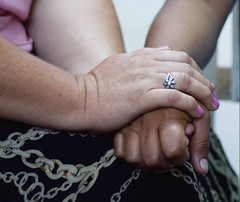| Walk a Mile-Sexual Violence Awareness-001 (Photo credit: pennstatenews) |
The inception of a 2011 famine was accompanied by mass displacement that saw thousands of internally displaced people (IDPs) descend upon Mogadishu.
“Insecurity, poor judicial and policing systems has contributed to this increase in sexual violence and cultivated an environment of impunity,” the Strategic Initiative for Women in the Horn of Africa (SIHA Network) and East and Horn of Africa Human Rights Defenders Project (EHAHRD) said.
The two agencies hosted an event on the margins of the 53rd Ordinary Session of the African Commission on Human and Peoples’ Rights, ACHPR, which started in Banjul, The Gambia on April 9 and is ending on April 23, 2013.
The SIHA Network and EHAHRD said the side event is meant to raise awareness of sexual violence taking place in Somalia and the threats to Human Rights Defenders working to address the issue.
“Alongside reluctance on the part of the state to arrest, prosecute and punish perpetrators, there has been a rise in arrests and arbitrary detention of those who report sexual violence,” Hala Alkarib, Regional Director of SIHA Network said.
Rights defenders in the region also said harassment; arrest and detention of those who collect information on sexual violence have similarly increased.
“Together, these acts send a crude warning to those who seek redress for such gross violations of human rights and doubly punish survivors who have already endured the trauma of rape,” Ms. Alkarib said.
She said the government of Somalia and its partners should urgently commit to apply robust measures to protect women and girls and end impunity.
The African Commission has 12 Human Rights Commissioners from across the continent whose job it is to address violations taking place across Africa.
| A women's centre lawyer supports a young survivor of sexual violence as she tells her story. (Photo credit: Amnesty International) |
SIHA Network and EHAHRD documented that on 5 February, 2012, a Mogadishu woman who was raped by government security forces and a freelance journalist, Abdiaziz Abdinur Ibrahim, who interviewed the victim, were convicted and sentenced to a year in jail.
The woman was accused of insulting a government body and making false claims, while the journalist was similarly charged with insulting a government body despite the story never being published.
Charges against the woman were dropped on 3 March, 2013 following international outcry, and the sentence against the journalist reduced to six months. By 17 March, 2013 the charges against Abdiaziz were dropped and he was released.
Perhaps one successful case is that on 16 January, 2013, Abdi Isman Ali Magan was convicted of rape and sentenced to death by firing squad, he was killed the same day. But, rights defenders say “this singular example of successful prosecution and the deployment of punishment is not indicative of broader efforts to tackle impunity and implement justice”.
Somali President Mr. Hassan Sheikh Mohamud announced on 26 November, 2012 that the death penalty would be applied to anyone found guilty of committing rape.
Written by Modou S. Joof
Follow on Facebook: The-North-Bank-Evening-Standard
THIS ARTICLE FIRST APPEARED ON FRONT PAGE INTERNATIONAL. SEE STORY HERE.













No comments:
Post a Comment
The views expressed in this section are the authors' own. It does not represent The North Bank Evening Standard (TNBES)'s editorial policy. Also, TNBES is not responsible for content on external links.